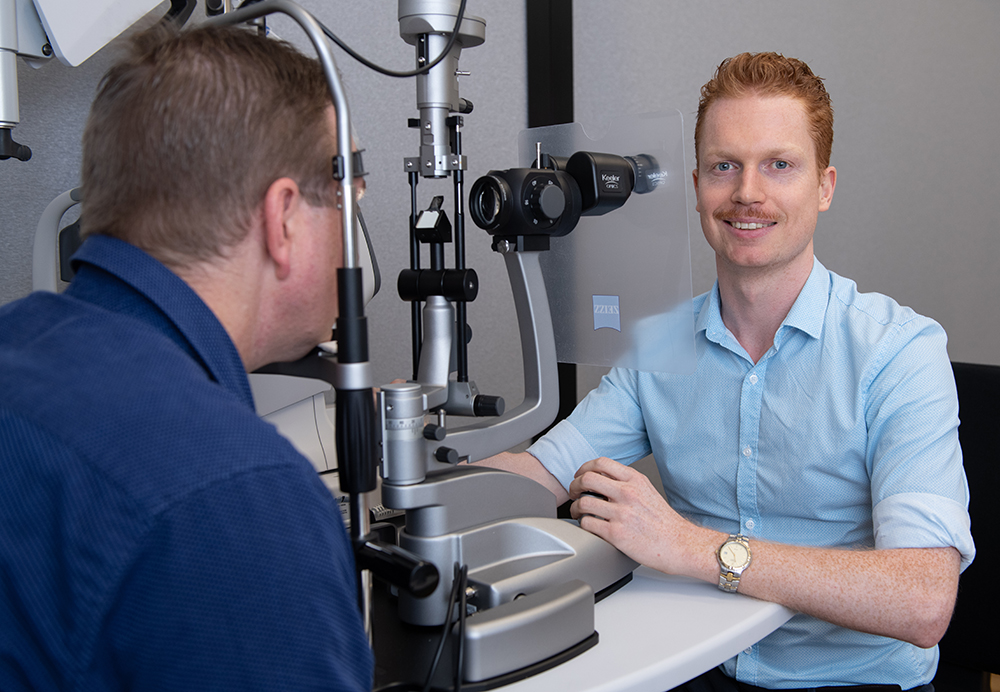
Low-vision specialty services are now available at Junic Eye Care in Coombs. This is a sponsored post.
JUNIC Eye Care, a new community optometry practice offering comprehensive eye care services, has launched at the Junic Specialist Centre in Coombs.
Delivering personalised, full-scope optometry consultations with expert advice and state-of-the-art equipment, low-vision optometrist and orthoptist Juliet Menakaya says they’re now offering tailored low-vision assessment and rehabilitation services to support Canberrans who face daily vision challenges.
She says the new low-vision services and programs have been designed to address a gap in standard eye care services.
Junic Eye Care, a member of the Eye Care Plus group, is a supplier of low-vision devices such as hand-held optical and electronic magnifiers for day-to-day use, and powerful digital magnifiers for use in offices and education, she says.
Junic Eye Care’s low-vision services include a detailed vision assessment and an in-depth evaluation to identify which of their programs would best suit the patient.
Juliet says they offer a low-vision rehabilitation program using evidence-based strategies that can maximise or substitute for diminished sight, so that anyone with low vision can maintain independence and a sense of self-worth.
“We liken these principles to the kind of physical therapy provided for someone who has lost a limb,” she says.
“Rehabilitation for patients with low vision is so important. Research has shown that people with low vision tend to have more emotional difficulties and a higher risk of accidents than normal sighted individuals.”
Juliet says patients who have undergone rehabilitation have reported significant improvements in their functional abilities, a high rate of continued use of low-vision devices, improvement in reading and distance vision, and a general increased satisfaction with their quality of life.
“This rebuilding and reinforcement of the visual foundation is achieved through a process of evaluation and definition of individual goals, identification of potential assistive devices and training in using these devices,” she says.
Juliet says their goal is to maximise patients’ visual potential, so those with conditions like macular degeneration or diabetic retinopathy can benefit not only from the medical interventions provided by highly qualified ophthalmologists, but also their low-vision rehabilitation program.
Junic Eye Care offers this expert service at its primary eye health clinic which opened in September and operates out of the Junic Specialist Centre in the Molonglo Health Hub.
Part of the service is a technique called eccentric viewing training, which can optimise vision when central vision is lost due to macular degeneration, or for patients with scotoma (an area of partial alteration in the field of vision).
It enables a person to look slightly off-centre to make use of an unaffected area of the retina to be able to see, Juliet says.
“This is achieved through a guided training session, once or twice a week for six weeks, with each session lasting one or two hours,” Juliet says.
“The first session will give us a list of personal visual goals that direct the training and help with independent living skills.”
But Juliet cautions that rehabilitation is more than simply an introduction to low-vision devices.
“We only introduce devices after the patient has gone through the evaluation and sometimes after eccentric viewing training. Only then can appropriate recommendations for devices be made,” says Juliet.
“We take the time to really understand our patients’ vision and how it affects their life, from getting a full picture of their current difficulties and what they want to achieve.

“It might be anything from being able to read a newspaper independently, or to shop in the supermarket and be able to clearly see ingredient lists. “Once we know the patient’s goals, we can help with improving their quality of life.”
As vision is such a personal and complex area of everyday life, optometrist Dr Thomas Morton says it requires a “sophisticated approach in a clinical context”.
“We love seeing patients of all ages and encourage parents to bring their kids in early for an eye examination – children of any age can be assessed, and a good time for a first routine eye examination is age three,” he says. “The holy grail of healthcare is early detection and prevention of disease, and this is something that optometry can do very well.”
Junic Eye Care, Junic Specialist Centre, Molonglo Health Hub, 110 Woodberry Avenue, Coombs. Call 6178 0470, email eyecare@junic.net.au or visit juniceyecare.com.au
Who can be trusted?
In a world of spin and confusion, there’s never been a more important time to support independent journalism in Canberra.
If you trust our work online and want to enforce the power of independent voices, I invite you to make a small contribution.
Every dollar of support is invested back into our journalism to help keep citynews.com.au strong and free.
Thank you,
Ian Meikle, editor




Leave a Reply